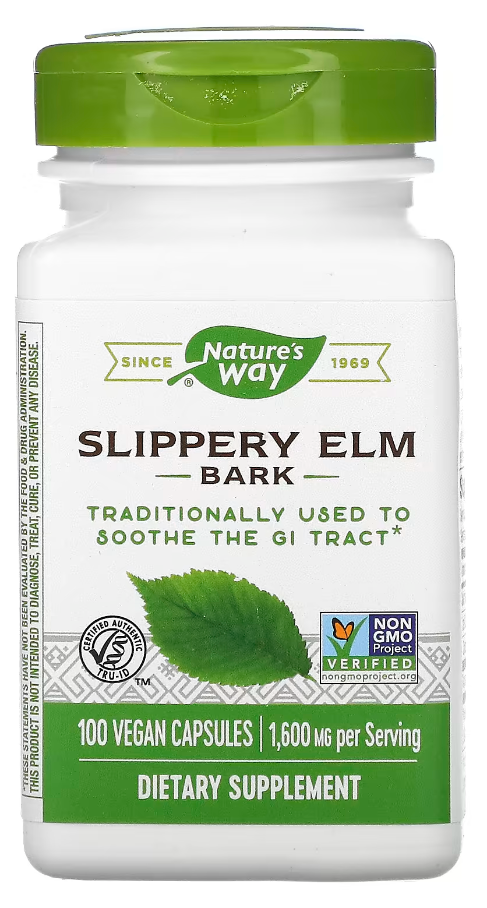Native Americans used slippery elm for many purposes, including the construction of canoes and household items, and its inner bark (slippery elm bark) was used as a natural remedy and was a major part of medicinal preparations used to treat fever, diarrhea, constipation, urinary tract infections, wounds, sore throats, and stomach upset.
What are the benefits of slippery elm bark in empirical medicine? Are there any side effects of slippery elm bark? See text analysis for details
What is slippery elm bark?
Elm (slippery elm), also known as slippery elm and red elm, is a deciduous mangrove tree native to North America and Canada. This tree can grow up to 25 meters tall and is known for its dark brown to reddish-brown inner bark.
It is called slippery elm because its internal bark produces mucus when chewed or mixed with water, which is a mixture of polysaccharides with many medicinal properties.
As an herbal supplement comes in many forms, including teas, powders, lozenges, tablets, capsules, ointments etc.
What are the proven benefits of slippery elm bark?
1. Good for bowel irritability
Irritable bowel syndrome, also known as irritable bowel syndrome, is a common functional gastrointestinal disorder with a prevalence of between 5% and 20%, depending on geographic area and criteria used for evaluation.
It is characterized by recurrent abdominal pain with changes in bowel habits (diarrhoea, constipation, or both), and is the most common condition in gastroenterology specialties with more than 3.5 million visits in the United States.
A preliminary trial (3-week trial of 31 patients with irritable bowel disorder) noted, Note 1
Constipation-predominant-IBS formula (elm bark and other herbs) significantly improves bowel habits and irritable bowel syndrome symptoms (including: straining, abdominal pain, bloating, stool firmness, severity).
The diarrhea-predominant-IBS formula (elm bark and other herbs) is not effective in improving bowel habits (significantly increased frequency of small bowel movements), although it does significantly improve some symptoms of irritable bowel syndrome (including: straining, abdominal pain, bloating).
*Conclusion: Due to small sample sizes, there is currently insufficient evidence to prove that elm bark is helpful for irritable bowel disorder
2. Beneficial for psoriasis
Psoriasis is a common chronic inflammatory skin disease characterized by the formation of scaly erythematous patches with distinct borders, which may be itchy and painful.
In addition to affecting the skin, psoriasis is associated with a variety of systemic diseases. About 75% of patients will have at least one comorbidity, the most common associated diseases being psoriatic arthritis and cardiovascular disease, others including depression, autoimmune diseases, Parkinson’s disease, and cancers such as skin cancer and lymphoma.
A case report of 5 psoriasis patients stated that dietary improvement regimens combined with saffron and elm bark tea helped reduce psoriasis symptoms such as redness, skin thickness, flaking, and affected skin area. Note 2
*Conclusion: Due to the small sample size, there is currently no clear evidence that elm bark is helpful in improving psoriasis
3. Beneficial for acute laryngitis
Acute pharyngitis, one of the most common respiratory infections in our environment, usually presents with a sore throat, severe pain when swallowing, fever, headache, nausea, vomiting, and abdominal pain.
There are several viruses and bacteria that can cause acute strep throat. Adenoviruses are the most common, and other viruses involved include rhinovirus, enterovirus, influenza virus A or B, respiratory syncytial virus, coronavirus, human metapneumovirus, Epstein-Barr virus, herpes simplex virus, cytomegalovirus, and human immunodeficiency virus type 1 (HIV-1). The most common bacterial cause is Streptococcus pyogenes (GABHS), which accounts for 30% of cases in children but less frequently in adults.
A randomized, double-blind, placebo-controlled clinical trial of 60 patients with a clinical diagnosis of acute pharyngitis found that elm bark-based herbal tea was significantly superior to placebo and temporarily relieved swallowing pain. Note 3
*Conclusion: For acute pharyngitis, the use of elm bark-based herbal tea may help temporarily relieve pain, but limited by the small sample size, more studies are needed for further verification
Are there any side effects of slippery elm bark?
To date, there have been few tests for the safety and efficacy of slippery elm bark in clinical studies.
For most people in good health, moderate oral administration is probably safe.
Safety precautions (4 contraindications to use)
1. Do not use by pregnant and lactating women (due to unknown safety)
2. Topical use of slippery elm bark on the skin may cause skin irritation and even contact dermatitis
3. Slippery elm bark may reduce the absorption of oral drugs and reduce the efficacy, so do not use it with drugs, or at least two hours apart
4. As with all dietary supplements, consult a doctor or pharmacist before use to ensure safety.
Where can I buy the highest quality Slippery Elm Bark that is recommended by most people?
| Nature's Way, Slippery Elm Bark, 400 mg, 100 Vegan Capsules (Direct shipping from the United States / Worldwide delivery) |
Product Features: Nature's Way is a health food manufacturer founded in the United States with a history of more than 50 years, with a very high sales and repurchase rate in major drugstores Non GMO Certified by Tru-ID third-party testing to ensure that the ingredients are pure and adulterated No artificial preservatives and colors Gluten Free | |

